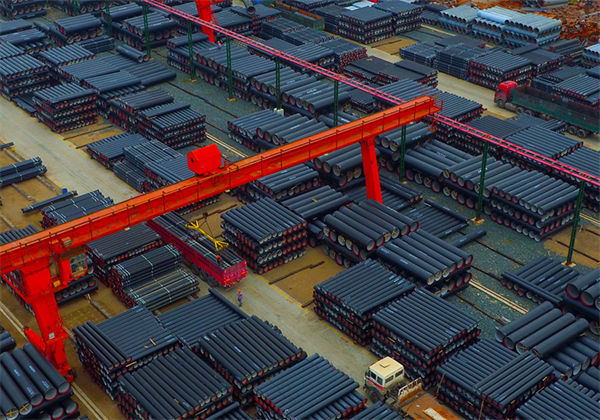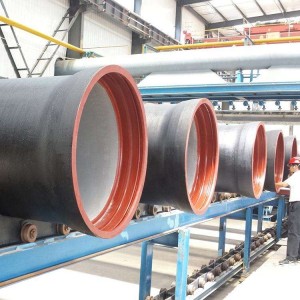Factory and Warehouse
Product Form
Ductile Iron Pipes All Types:
|
1 |
Material |
Ductile Cast Iron |
|
2 |
Joint Type |
T-Type(push-on joint) |
| K-Type(Mechanical Joint) | ||
| Self-Restrained | ||
| Flanged joint | ||
|
3 |
Standard |
ISO2531, EN545, EN598, etc |
|
4 |
Size |
DN80 - DN2600 (80mm - 2600mm) |
|
5 |
Classs |
K7, K8, K9, C40, C30, C25, etc |
|
6 |
Length |
6m, cut to 5.7m |
|
7 |
Internal lining
|
1. Portland cement mortar lining |
| 2. Sulphate Resistant cement mortar lining | ||
| 3. High-Aluminum cement mortar lining | ||
| 4. Epoxy Resin Lining | ||
| 5. Epoxy Ceramic Lining | ||
| 6. PU Lining | ||
|
8 |
External Coating |
Zinc+bitumen coating, |
| Customized coating such as Zinc-Epoxy, Alumina Powder, PU, FBE, Epoxy-Ceramic, etc. | ||
|
9 |
Rubber Gasket |
NBR rubber, SBR rubber or EPDM rubber ring as per ISO4633 |
|
10 |
Application |
Potable Water / Drinking Water/Sewage Water |
|
11 |
Packing |
DN100-DN300 in bundles; DN350-DN2600 in bulk ship |
Introduction

Our Cement Lined Ductile Iron Pipe is the epitome of excellence in water conveyance solutions. Crafted with precision from high-quality ductile iron, these pipes are fortified with a protective cement mortar lining that ensures exceptional corrosion resistance.
The cement mortar lining creates a reliable barrier between the iron surface and the conveyed water, safeguarding against the effects of corrosion, even in aggressive environments. This lining extends the pipe's service life, reducing maintenance costs and the need for frequent replacements.
Designed for versatility, our Cement Mortar Lined Ductile Iron Pipe caters to a wide range of applications, including potable water distribution, sewage systems, and industrial projects. Its robust construction withstands heavy loads and high pressures, ensuring reliable performance under varying conditions.
Compliant with industry standards, our dicl water pipes undergo rigorous testing to guarantee top-notch quality and safety. The cement mortar lining meets the necessary requirements for potable water usage, making it a reliable and safe choice for water transportation.
Choose our environmentally friendly Ductile Iron Pipe with Cement Mortar Lining for a sustainable and cost-effective water conveyance solution. Upgrade your infrastructure with this cutting-edge piping option, offering unmatched corrosion resistance and extended longevity. Experience efficiency and reliability with our Cement Lined Ductile Iron Pipe, ensuring a seamless flow of water for years to come.
Benefits of ductile iron pipe

Solid under loads
In underground conditions, the ductile cast iron pipe has a semi-rigid behaviour: it offers an excellent compromise between mechanical stress in the wall (small DN) and ovality (large DN). It can be laid in high and low height of cover, and easily in soil of low rigidity. The ”ground/semi-rigid pipe” system offers optimum mechanical stability over time, without risk of buckling in large DN.

Insensitive impacts
The ductile cast iron structure has a high elastic deformability and a high resistance to crack initiation: it results in excellent impact resistance. The cast iron pipes are perfectly suited to transport conditions over long distances (truck, train or ship), handling conditions on sites and to different types of backfilling. The ductile cast iron pipelines may be laid in very difficult areas: rocky mountain slopes for hydroelectric plants, crossings for cantilever bridges, rockfill for submarine outlets.

Push-in joint system

Excellent hydraulicity
The centrifugation process ensures a perfectly smooth and even cement surface. The Colebrook roughness coefficient of an isolated pipe is k = 0.03 mm. We recommend the use of an average value of k = 0.1 mm for sizing networks in order to take into account all the different load losses caused by singular points (tee fittings, elbows, valves, etc.)

Pressure resistance
The ductile cast iron pipe are designed to withstand pressures much greater than the values usually encountered on the networks. The wall thickness is calculated with a safety factor of 3 with respect to the maximum operating pressure. This additional safety margin is very useful to the impacts during installation, accidental overpressure and mechanical operating fatigue.











